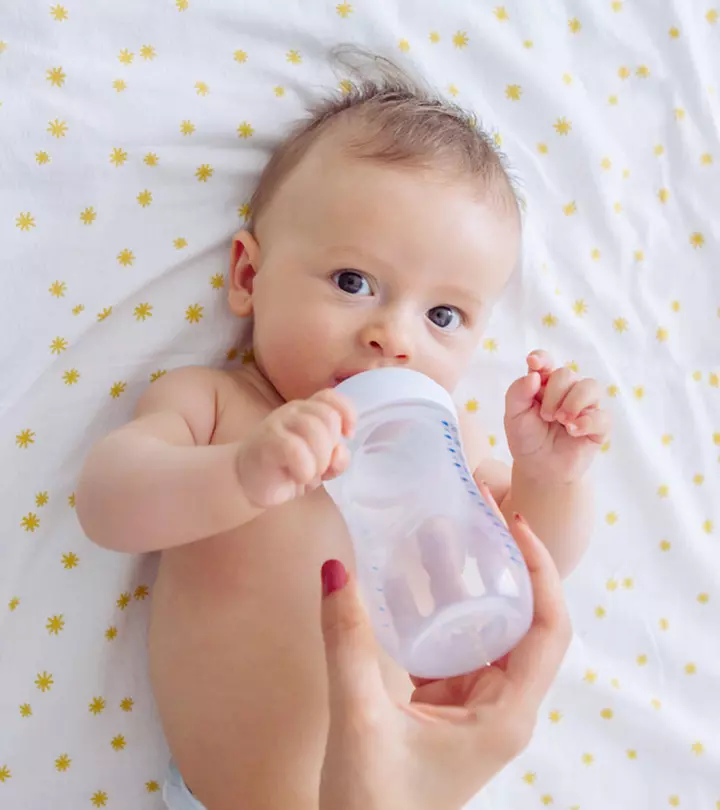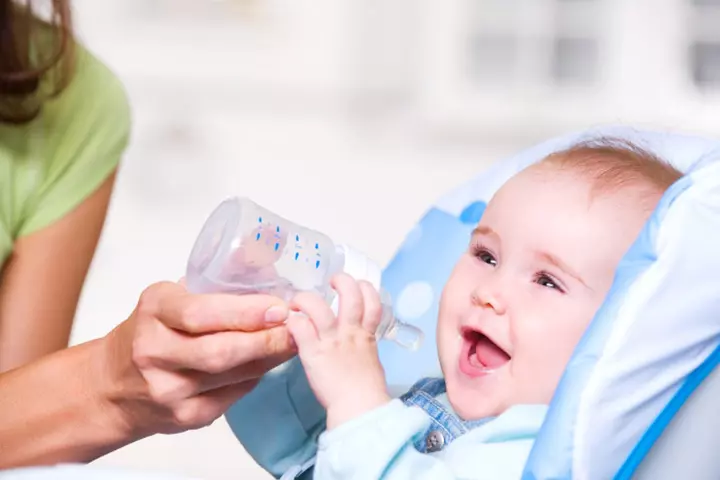
Image: iStock
While we’re all aware of the importance of staying hydrated, this rule doesn’t necessarily apply to your newborn baby, especially if they are under 6 months old. For infants in this age group, water is a big no-no, as their primary source of hydration and nutrients should be breastmilk or formula. Many mothers are aware of this guideline but might not understand the reasons behind it. The truth is that a baby’s body is not physiologically prepared to handle water until they reach several months of age. Their tiny tummies make them vulnerable to both nutritional deficiencies and water intoxication if water is introduced too early. If you’re curious about why it’s best to avoid giving your baby water and when it’s safe to introduce it, this article will provide you with more insights. Read on to learn further!
Nutrition Interference
During those initial months, your baby’s tummy is incredibly small and still developing. It’s quite astonishing to note that at birth, a baby’s stomach can only hold around 1 to 2 teaspoons, equivalent to 5 to 10 milliliters (mL). This small capacity means their tummy empties quickly, leading to frequent diaper changes and feedings. It’s crucial to fill their tiny stomachs with nourishing and hydrating liquids like breastmilk or formula. Therefore, the significant mistake that parents might make by giving their babies water is providing a substance that offers minimal nutritional value, depriving them of essential vitamins and calories required for healthy growth. Although a baby’s tummy does gradually grow during the first six months, their stomach capacity is still relatively limited. For instance, at 1 month old, they can typically hold about 2.7 to 5 ounces (80 to 150 mL). By 6 months, when you can start introducing small sips of water, their stomach can generally accommodate about 7 ounces (207 mL) at a time. However, it’s important to monitor their water intake even at this stage.
Water Intoxication
Image: IStock
Giving water to babies before they are ready can pose a significant risk, as they have a higher likelihood of developing water intoxication. You might wonder, how can water be toxic? Well, for your baby, it can be. In fact, water can be harmful if consumed in large quantities, but what constitutes “large” depends on one’s size and age. For a healthy adult, it would take drinking several liters of water in a short span of time to reach the point of water intoxication. So, yes, there’s a risk of excessive water consumption for adults too. However, this risk is much more pronounced in babies, given their small stomachs and underdeveloped kidneys.
But why is giving babies too much water a concern? Doesn’t our bodies need water? While our bodies do need water, there’s a delicate balance to maintain. When babies are given more water than their kidneys can handle, the excess water enters their bloodstream. This dilutes the bloodstream and reduces the concentration of vital electrolytes, such as sodium. Diluting the bloodstream too much can put babies at risk of hyponatremia, a condition characterized by dangerously low levels of salt in the blood. Therefore, providing even a moderate amount of water to a baby in a short period can potentially lead to hyponatremia. In severe cases, hyponatremia can result in brain swelling or even be fatal.
When Can Your Baby Have Water?
Image: IStock
When your baby reaches 6 months of age, it’s acceptable to introduce a small amount of water, typically around a teaspoon or so. This helps familiarize them with the idea of quenching their thirst with water, although breastmilk or formula should remain their primary source of hydration. At this stage, water may be seen as a novelty, and most babies will still prefer milk. Some might even react with a funny face due to the taste of water, which is perfectly normal. However, as your baby grows, their acceptance of water as a drink will increase. By the time they reach 1 year old, you can gradually incorporate larger quantities of water into their diet, alongside cow’s milk, to enhance their nutrition.
Taking care of a baby is never as easy as it seems. Even a sip of water can do a lot of damage when you have a fragile newborn. So, make sure that you keep water far out of reach until it’s safe for your baby to consume. Happy parenting!















